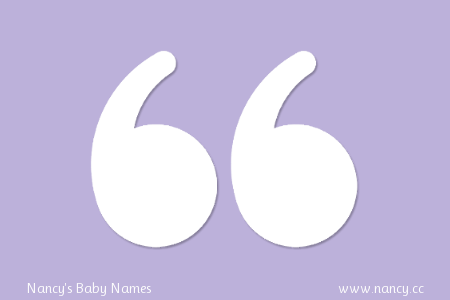About the inclusion of the name Emmeline in the Fleetwood Mac song “Seven Wonders” [vid], from the book Stevie Nicks: Visions, Dreams and Rumours (2014) by Zoë Howe:
After hearing [songwriter Sandy] Stewart sing the song first, Stevie misunderstood some of the words, hence the line ‘All the way down to Emmeline’, which has mystified fans for years. The original line was ‘All the way down you held the line’, but the use of a name like ‘Emmeline’ is typical for Stevie, so accustomed are we to hearing her throw in women’s names — ‘Sara’, ‘Lily’ — and thus we look for the clues she scatters in her songs.
[The line sounds more like “on the way down to Emmeline” to me, but it’s hard to tell. It’s also hard to tell if the song, which saw peak popularity in mid-1987, gave a boost to the baby name Emmeline that year — what do you think?]
From Through It All, the 2009 autobiography of Christine King Farris (older sister of Martin Luther King, Jr.):
My full name is Willie Christine King. Hardly anyone knows my first name. I am rarely called by it. “Willie” was chosen as a way to pay homage to the Williams side of my family; it was given in tribute to my maternal grandfather, Reverend A. D. Williams.
From a Louder interview with John Rzeznik about the Goo Goo Dolls’ hit song “Iris”:
By the time Rzeznik had ironed out some of the “ugly chord sequences”, he had a swooning future classic on his hands. Only the name was required. “I’m horrible at naming songs,” he says, “so it’s the last thing I do. I was looking through a magazine called LA Weekly and saw that a great singer-songwriter called Iris DeMent was playing in town. I was, like: ‘Wow! What a beautiful name.’
(The song doesn’t actually include the name Iris in the lyrics, and yet the usage of the baby name Iris does seem to rise at a faster rate in 1998 and 1999, so…did the song influence the name? Wdyt?)
From a 2010 NPR article about Sharona Alperin, who inspired the 1979 song “My Sharona”:
The cover art of the single “My Sharona” actually features Alperin posing in a revealing tank top and tight jeans. For some time, she was famous in her own right. […] “I remember going on tour, and seeing sometimes people dress up. And I’d say, ‘What are you dressed up as?’ And they would say, ‘Sharonas.’
From an article about Beatrix Potter finding character names via headstones:
The names for Beatrix Potter’s much-loved cast of animal characters may have come from ageing headstones.
Peter Rabbett, Jeremiah Fisher, Mr Nutkins, Mr Brock and Mr McGregor have all been found on stones at Brompton cemetery, west London, near where Miss Potter lived from 1863 to 1913. This seems to confirm local rumours that have circulated for years about the source of the names of her characters.
How spiritual teacher Eckhart Tolle (born Ulrich Tölle) came up with his new name:
Some time after this “inner transformation”, Tolle changed his first name from Ulrich to Eckhart following a dream in which he saw books lying around. On the cover of one was the name Eckhart and he knew he had written it. By coincidence, he bumped into an acquaintance, a psychic, a few days later who, for no apparent reason, called him Eckhart! Having become a completely different person he was ready to relinquish the name Ulrich and the unhappy energy the name held for him.
(Other sources say Tolle chose “Eckhart” in deference to 13th-century German theologian/mystic Meister Eckhart.)


